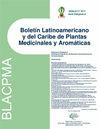Plants and intestinal parasitosis: a review on ethnopharmacological use by the Kantaruré-Batida indigenous community of Brazil
IF 0.7
4区 医学
Q4 INTEGRATIVE & COMPLEMENTARY MEDICINE
Boletin Latinoamericano y del Caribe de Plantas Medicinales y Aromaticas
Pub Date : 2022-01-01
DOI:10.37360/blacpma.22.21.3.17
引用次数: 0
Abstract
Indigenous knowledge is one of the most notable traditional sources about plants used to treat diseases. Thus, the aim of this study was to describe the botanical features and to investigate the pharmacological properties of plants used by the Kantaruré-Batida community to treat intestinal parasitosis. Botanical characterization was performed based on integrative review and on access to ‘Flora do Brasil’ platform, whereas plants’ pharmacological properties were investigated through systematic review. Among the 21 ethnospecies used, 48% were described as having activity against intestinal parasites. Although 52% had no such activity described, other properties can account for their use, that indicates that further studies are required. Therefore, this review reinforces the importance of valuing indigenous knowledge as tool to guide antiparasitic agent trials.植物与肠道寄生虫病:巴西kantarur - batida土著社区的民族药物学研究综述
土著知识是关于用于治疗疾病的植物的最著名的传统资源之一。因此,本研究的目的是描述kantarur - batida群落用于治疗肠道寄生虫病的植物的植物学特征和药理特性。植物学特征是基于综合评价和“Flora do Brasil”平台进行的,而植物的药理学特性是通过系统评价来研究的。在使用的21种人种中,48%被描述为对肠道寄生虫有活性。虽然52%没有描述这种活性,但其他特性可以解释它们的用途,这表明需要进一步的研究。因此,本综述强调了重视本土知识作为指导抗寄生虫药物试验工具的重要性。
本文章由计算机程序翻译,如有差异,请以英文原文为准。
求助全文
约1分钟内获得全文
求助全文
来源期刊

Boletin Latinoamericano y del Caribe de Plantas Medicinales y Aromaticas
PHARMACOLOGY & PHARMACY-
CiteScore
1.30
自引率
14.30%
发文量
49
审稿时长
6-12 weeks
期刊介绍:
The Boletín Latinoamericano y del Caribe de Plantas Medicinales y Aromáticas (BLACPMA), [Latin American and Caribbean Bulletin of Medicinal and Aromatic Plants]; currently edited by the publishing house MS-Editions, is a bi-monthly international publication that publishes original peerreviewed research in the field of medicinal and aromatic plants, with nearly 20 years of experience. BLACPMA is a scientific journal that publishes two types of articles: Reviews (only in English) and Original Articles (Spanish or English), its main lines of action being agronomy, anthropology and ethnobotany, industrial applications, botany, quality and standardization, ecology and biodiversity, pharmacology, phytochemistry, pharmacognosy, regulatory and legislative aspects. While all areas of medicinal plants are welcome and the experimental approaches used can be broad and interdisciplinary; other areas of research that are not mentioned depend on the Editorial Committee for their acceptance.
 求助内容:
求助内容: 应助结果提醒方式:
应助结果提醒方式:


